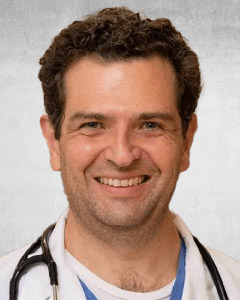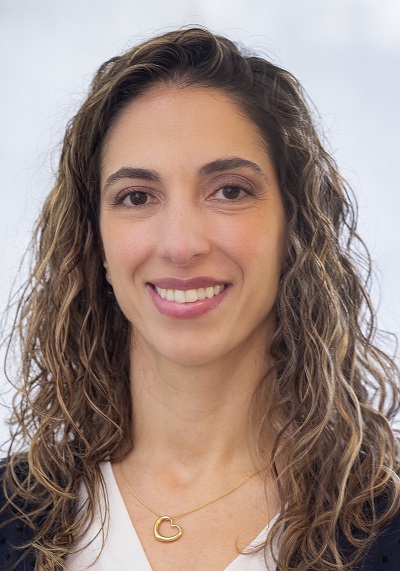“The treatment continues to go well, and I feel good. I love the fact that it’s a pill—no IV or needles. I’m back to work, traveling, going to church and doing all the things I enjoy.”

A woman beats back lung cancer thanks to advanced, targeted therapy.
Cynthia Odeh, a nurse in Newark, was navigating an intersection in March 2022 when a car ran a red light, slammed into her vehicle and sped away.
“‘This is the worst luck!’ ” she remembers thinking. But in one of life’s ironies, the collision may have saved her life.
Unknown to the 58-year-old mother of four grown children and lifelong nonsmoker, she had stage 2B lung cancer. CT scans during a precautionary trip to the emergency room revealed the threat.
“The doctor said my head and neck looked fine—but then asked if I smoked,” Cynthia says. “I said no, thinking, ‘Why is he asking me this?’” The scans had shown an abnormal nodule on Cynthia’s left lung, and the physician told her to contact her primary care provider right away.
Minimally Invasive Surgery
Each year, more than 2 million people worldwide are diagnosed with lung cancer, the leading cause of cancer-related deaths. Most have a history of tobacco smoking, but about 10 to 20 percent of lung cancers occur in nonsmokers.
What’s more, lung cancer disproportionately affects people of color, who are more likely than white Americans to be diagnosed at a later stage and who may not receive treatment.

But despite challenges, there’s good news: “With screening, better diagnostic tools and improved treatments, the mortality rate from all cancers— particularly lung cancer—has steadily declined over the past 30 years,” says medical oncologist Missak Haigentz, MD, Chief of Thoracic and Head and Neck Medical Oncology at Rutgers Cancer Institute and Clinical Director of Oncology Integration at RWJBarnabas Health, who is part of the team that gave Cynthia her life back.
Cynthia’s journey toward healing began when her doctor referred her to Joanna Sesti, MD, Director of Thoracic Surgery, Northern Region, at RWJBarnabas Health. Fellowship-trained in minimally invasive and robotic thoracic surgery, Dr. Sesti specializes in chest-area conditions including lung and esophageal cancers, treating patients at Cooperman Barnabas Medical Center, Jersey City Medical Center and Newark Beth Israel Medical Center—all RWJBarnabas Health facilities.

“Dr. Sesti made me feel comfortable right away,” Cynthia says. “When she told me I’d need surgery, I was confident I was in good hands.”
During Cynthia’s surgery at Cooperman Barnabas Medical Center, Dr. Sesti first removed a wedge-shaped section of lung tissue and analyzed it under a microscope. Confirming cancer, she proceeded to take out the diseased lobe along with lymph nodes. “An advantage to this approach is that we condense diagnosis and therapy into one procedure,” explains Dr. Sesti.
Left with only four small incisions, Cynthia—like many of Dr. Sesti’s patients—was discharged from the hospital two days after surgery.
Lifesaving Advantages
Cynthia followed up with Dr. Haigentz to determine whether she needed further treatment to prevent recurrence. “He’s very compassionate and knowledgeable,” she says. “He wanted to address this cancer aggressively.”
Dr. Haigentz leads clinical trials for patients with lung and head and neck cancers at both RWJBarnabas Health and Rutgers Cancer Institute, the state’s only NCI-designated Comprehensive Cancer Center.
“The way we treat lung cancer has changed a great deal in the past 15 years,” says Dr. Haigentz. “We once viewed people with lung cancer as all having the same disease. Now we know that all lung cancers are not the same genetically.”
Medications can now target a cancer’s specific characteristics. As a result, lung cancer has seen the greatest recent declines in cancer deaths in the U.S. “There is tremendous hope for the future of cancer care,” Dr. Haigentz says.
Genetic testing of patients whose tumors are surgically removed lets physicians provide individualized treatment based on each tumor’s molecular characteristics. Cynthia’s tumor was found to have a mutation in a gene called EGFR. “This mutation is more common among nonsmokers with lung cancer,” says Dr. Haigentz.
He proposed four rounds of chemotherapy followed by three years of osimertinib, an oral medication. “Osimertinib is the first lung-cancer targeted medication to receive FDA approval for postoperative treatment of early-stage lung cancer,” says Dr. Haigentz. “A second targeted drug, alectinib, also received FDA approval for postoperative treatment of ALK [anaplastic lymphoma kinase]-positive lung cancer earlier this year.”
In combining the drug with chemotherapy, “we wanted the best treatment possible to reduce her risk of recurrence,” Dr. Haigentz says.
Chemotherapy behind her, Cynthia began taking osimertinib in December 2022. “The treatment continues to go well, and I feel good,” she says. “I love the fact that it’s a pill—no IV or needles. I’m back to work, traveling, going to church and doing all the things I enjoy.”
She sees Dr. Haigentz and Dr. Sesti for follow-ups and has CT scans twice a year. “We’re thrilled that she’s doing so well,” says Dr. Haigentz. “As a nurse, she helps so many people. We’re glad we were able to help her.”
Learn more about lung cancer care at RWJBarnabas Health.
RWJBarnabas Health, in partnership with Rutgers Cancer Institute—the state’s only NCI designated Comprehensive Cancer Center—provides close-to-home access to the most advanced treatment options. To schedule an appointment with one of our cancer specialists, call 844-CANCERNJ or contact our Cancer Centers.
 View full issues of Healthy Together magazine by New Jersey region:
View full issues of Healthy Together magazine by New Jersey region: